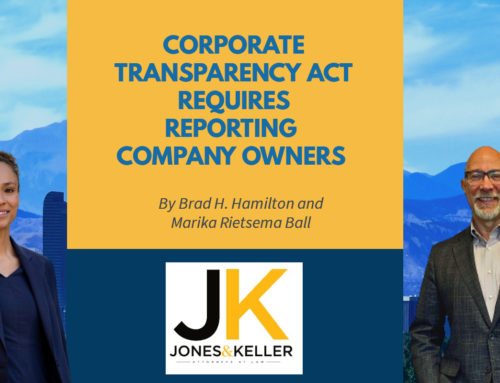On April 13, 2015 Governor Hickenlooper signed the Colorado Crowdfunding Act into law. The Crowdfunding Act becomes law 90 days after the current legislative session adjourns (around August 5, 2015). However, raising money under the Act will not be allowed until the Colorado Securities Commissioner adopts crowdfunding regulations, so there is not yet any crowdfunding in Colorado.
When the regulations are adopted, Colorado businesses will be able to raise money in a crowdfunded offering solely in Colorado, under the federal intrastate offering exemption. That means the offers may be made only to Colorado residents, and only Colorado residents may invest.
As of the date of this article, there is no U.S. federally allowed crowdfunding equity investment regime. On October 23, 2013 the SEC published proposed “crowd funding” rules, as required by the JOBs Act, and they have not yet been approved and adopted. “Crowdfunding” in the U.S. currently applies only to (1) donations, or pre-sale purchase of goods or services, through websites such as gofundme, KickStarter, indiegogo, etc., and does not involve sale of equity, or (2) state crowdfunding registration exemptions.
The crowdfunding rules proposed by the SEC are functionally limited and if adopted as proposed would have little utility. The SEC proposal has low fundraising limits, and very high costs, such as audited financial statements, meaning that the cost of crowdfunding would use up most of the funds raised, and would not be financially prudent in light of other, less expensive fund raising methods such as traditional private placements. To counter the vacuum on crowdfunding left by the SEC, several states have begun passing their own crowdfunding exemptions. Most of those rely on the intrastate offering exemption from federal registration requirements, allowing offers and sales only to residents of that state, though Maine’s recent rules allow investment from non-Maine residents. Texas, Indiana, Wisconsin, Washington, and Michigan are some of the states that have pending proposed, or adopted, intrastate crowdfunding rules. Click here for a rundown of state exemptions.
The Colorado Crowdfunding Act joins that list. Under the Colorado Act there is a firm $1 million limit on how much money an issuer may raise through crowdfunding in any 12-month period, unless the issuer has audited financial statements on file with the Colorado securities commissioner, and then the amount increases to $2 million.
There is no limit on how much accredited investors can buy in crowdfunding offers, but non-accredited investors cannot invest more than $5,000 in crowdfunding offers in any 12-month period. Individual accredited investors are people who have more than $1 million in assets (excluding the equity value in their home), or who make more than $200,000 a year, or $300,000 a year with their spouse.
Each crowdfunding offer must comply with relatively strict rules, when compared with the flexibility issuers have when conducting a private placement. The issuer must provide a disclosure document with certain required language (legends) to each potential investor. A disclosure document (commonly called an offering circular, offering memorandum, or prospectus), although highly recommended in almost all offerings, is not required by law for some private placements.
The offering must be a “minimum – maximum” offering; that is, all investor funds must be held in a bank escrow account until the minimum amount of investment is raised, and all sales in the offering must cease once the maximum is raised. Oversubscriptions are not allowed. The minimum cannot be less than 50% of the maximum. For example, an issuer who does not have audited financial statements will probably structure the offering for $1 million maximum, $500,000 minimum. This means the issuer will not have access to any of the money it is raising in the crowdfunding until it has raised $500,000, at which point the issuer may start withdrawing money from the escrow account.
At least 10 days before the offering starts, the issuer must:
- file a form with the Colorado Securities Commissioner giving notice of the offering;
- pay a fee (which has not yet been established);
- file a copy of the issuer’s disclosure document (discussed below); and
- file a copy of the issuer’s bank escrow agreement.
After the offering the issuer must provide quarterly reports to its owners, either directly or by posting on the intermediary’s website. The quarterly report must include executive compensation and management’s analysis of operations and financial condition, and must be filed with the Colorado Securities Commission.
In spite of these many requirements, which are similar to but less onerous than a registered public offering, the company also cannot advertise its crowdfund offering, except through a public statement saying only that it is conducting an offering and directing interested persons to the intermediary’s website.
Unlike in a private placement, the company cannot sell its shares directly to investors in a crowdfunding offer. Instead, the offering is done via (1) a licensed broker-dealer, (2) a licensed sales representative, or (3) on the Internet by a website authorized to make crowdfund offers, called an “intermediary.” Intermediaries are discussed in detail in Part 2 of this article.
Finally, the Colorado Crowdfunding Act specifies that a crowdfund offering “shall not be used in conjunction with any other [private placement] exemption…during the immediately preceding twelve-month period.” I can only speculate what that sentence means. It may mean that an issuer cannot conduct a crowdfund offering if they have conducted an exempt private placement in the preceding 12-months, or that an issuer cannot convert their private placement into a crowdfund offering. Hopefully it will be clarified in the rules to be issued by the Colorado Securities Commission.
In passing the Colorado Crowdfunding Act the legislature included this statement:
“Creating a Colorado crowdfunding option, with limitations to protect investors, will enable Colorado businesses to obtain capital, democratize venture capital formation, and facilitate investment by Colorado residents in Colorado start-ups, thereby promoting the formation and growth of local companies and the accompanying job creation.”
While the Colorado Crowdfunding Act increases the amount that can be raised in crowdfunding offers from that initially proposed by the SEC, it retains many of the filing and continuous reporting requirements that make the SEC crowdfunding proposal so unworkable. It remains to be seen whether crowdfunded equity offerings will be a useful or viable alternative to traditional private placements.
Part 2 of this article will discuss the requirements for “intermediaries.”




